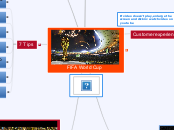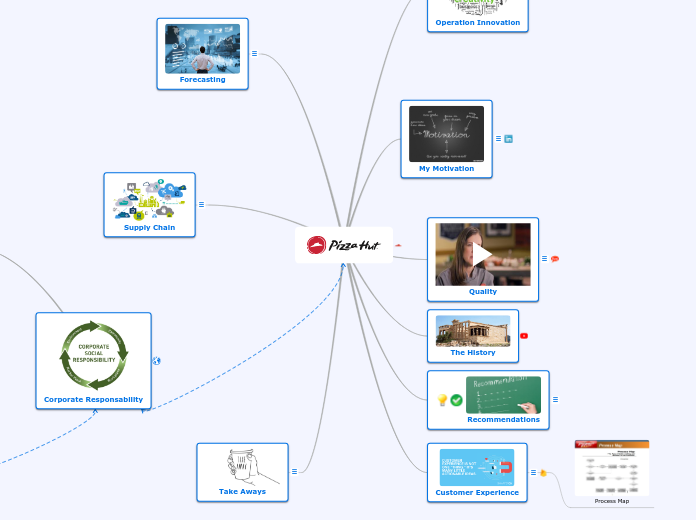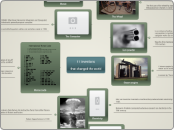If video doesn't play, enlarge the screen and click in: watch video on youtube
FIFA World Cup
In this mind map I will talk about FIFA World Cup, giving a brief introduction, and talking about the customer experience, technology and things they do to satisfy all the world during the competition.
Armando Sousa Cañizo
Customer Experience Management
IE Business School
Conclusion
To conclude it can be said that the success of these events throughout history in addition to the emotion that distributes football is due to the service to the consumer, is an event in which large brands governments and sports institutions have succeeded in getting people around The world unites and shares emotions and joys. It is important to always rely on the technology and keep moving forward and adapting to the needs of the client to be able to cover them.
7 Tips
Roger Brown gives us seven insights into the football fan’s psyche
7. Deliver a premium product
Football teams deliver more than products, they offer a premium experience. Fans will live and breathe every minute of each World Cup game through a sense of pride to the team and what they stand for. For brands, they need to deliver a sense of individuality in the experience they offer to all of their customers, so that they feel unique and understood by the brand. A premium product doesn't necessarily need to be the most expensive thing; but it does need to have that sense of individuality.
6. Think about their long-term aims
Have a real conversation with customers! Gone is the age of a brand monologue, where brands say why they are the best. We are in a multichannel dialogue where customers tell brands if they are the best and more importantly, why.
We will continue to support England long after the World Cup because we want to go with them on their journey, and experience the emotional rollercoaster! Brands should want to engage with their customers at every step of the experience, both good and bad. Often a brand is truly tested when something goes wrong. Consumers want to feel appreciated and satisfied. Feeling a part of a brand experience will ensure that consumers continue to buy into the brand and ultimately develop a sense of absolute loyalty.
5. Give them something to shout about
The concept of football loyalty is unwavering commitment. It would be absurd to think that an Arsenal supporter would switch allegiance to Tottenham Hotspur or that a Dutch fan would support Germany after a low performance game, and yet it isn’t so ridiculous for consumers to switch between one brand and another after a poor customer experience.
One of the strongest assets a team has is its supporters, and the key to a successful brand is its customers. Social media allows consumers to engage with your brand and fellow consumers, so it is essential that brands focus on engagement, honesty and transparency to build a loyal following.
4. Make the experience personal
Football fans have a strong sense of pride when it comes to team allegiance through a collective experience. However, this is not created through a personalised experience but through unwavering loyalty. Whereas retailers are committed to the individual experience as they need to analyse customer behaviour in order to optimise the customer journey through one-to-one real-time engagement.
Brands need to focus on delivering strong and consistent brand values across all customer touch points. Customers want to feel appreciated and engaged throughout their journey. This can only be achieved by engaging with customers one-on-one and providing them with the right content, messages and opportunities. This will not only increase sales but deliver a richer experience for customers that show their brands really know who they are.
3. Understand their aspirations
As England fans, we’d like to win the World Cup, but we don’t expect it. Brazil fans, on the other hand, expect to win and go through each game with style and panache. There’s different aspirations expected through each team’s ‘journey’.
To transfer this into the world of business, it has become more of a challenge for brands to determine Customer Lifetime Value (CLV) in this multichannel digital age, but it has also become imperative that this is a priority. Having an understanding of who your customer is, what their shopping journey will be and the ability to provide them with services, products and content that is relevant is key to developing brand loyalty and ultimately increasing sales.
Having a focus on the customer journey, beyond a one-off transaction is vital to delivering a richer and more engaging brand experience. With return visits, brands will understand more about the individual customer behaviour and deliver a memorable experience, where the customer feels like they have been treated with respect and a valuable part of their business.
2. Make sure they feel at home
Traditionally supporters were aligned with their clubs and teams because of their proximity of the team to their home. However, today football fans transcend geographical boundaries. Football teams have created an environment that allows fans to have a sense of belonging to something more than a brand, but an overall customer experience where they are not limited to location but united in common interests and aspirational brand values.
Modern retail has a different challenge as brands are operating across several different locations, both offline and online. Retailers need to deliver a seamless brand experience across all of these channels. Social media has provided an opportunity for brands to interact and nurture its community online. Consumers can engage with the brand and discuss their shared experiences with fellow consumers, which will allow brands to create ambassadors who will champion the brand values.
1. Don’t let your customers switch sides
Football fans have an unflinching allegiance to their team, which retailers should be envious of. The strong sense of brand affinity and commitment to their fan journey is not limited to their team’s success. For instance - we will continue to support England long after this World Cup is over, regardless of the result.
However, football teams and brands have very different relationships with their supporters and shoppers, and so they should. The concept of football loyalty is centred on a belief system, that transcends brand values and, where supporters are devoted to each game, regardless of the result. Whereas brand values are critical to retailers as consumers are constantly evaluating whether the brand has lived up to it with each experience. A brand needs to personalise the engagement to each individual customer and deliver the best value.
News
This is a news of a result of a survey in Brazil when the worls cup start.
Fan Fest
The FIFA Fan Fests are public viewing events organized by FIFA and its partners which allow people to watch the FIFA World Cup with thousands of fans from all around the world. The Fan Fest first became part of the official program for the 2006 FIFA World Cup in Germany, following the huge success of unofficial public viewing events in South Korea during the 2002 FIFA World Cup. It was a great success, leading FIFA to expand it to include several cities worldwide for the 2010 FIFA World Cup in South Africa. The locations are large enough to fit many thousands of people, and feature gigantic LED displays which broadcast the matches live.
Rusia Fan fest 2018
Customer experience
It is incredible how much money countries invest for the World Cup, inversions for new stadiums, hotels and all services needed are done to satisfy people around all the world
Customization
Human touch
Technology
WOOW Factor
History
The FIFA World Cup, is an international association football competition contested by the senior men's national teams. The current format of the competition involves aqualification phase, which currently takes place over the preceding three years, to determine which teams qualify for the tournament phase. The 20 World Cup tournaments have been won by eight different national teams. Brazil have won five times, and they are the only team to have played in every tournament. The other World Cup winners are Germany and Italy, with four titles each; Argentina and inaugural winner Uruguay, with two titles each; and England, France and Spain, with one title each.









